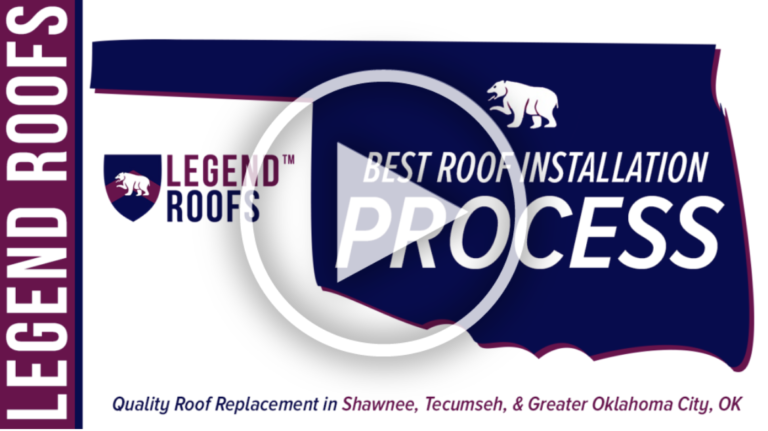New Roof Installation
Installing a new roof is not a difficult task for a team of experienced roofing professionals, but there are a few things you need to do and know to help the process go as quickly and smoothly as possible. Here are a few new roof installation tips for communicating with your roof contractor, as well as a pre-work checklist that can help you to minimize disruption prior to, during, and after the roof installation.
New Roof Installation: Proper Roof Install Techniques
Your new roof installation will start by the roofing material distributor delivering your new roof material. A Legend Roofs representative will check-in the material, make sure all material, as well as the correct material, was dropped by the distributor. A few things you want to look for during the new roof installation process are the correct materials and proper installation.
When we talk about proper installation we refer to the following:
- Tear off the old felt and inspect the deck for rotten wood.
Removal of your old existing roof is task number one. This process can take as few as four hours or as much as a full day, this will depend on the size, pitch, and how many layers of shingles and felt the roofing crew runs into. In Norman, Oklahoma City, and all of Oklahoma it is an accepted practice to do what is called a layover. This is where one layer of shingles is added on top of the existing layer. However, this is not a good roofing practice.
In some areas of the country, this practice is not accepted, however, it is frowned upon by most shingle manufacturers and is unacceptable for Legend Roofs. Removal of the old felt allows the roofing crew to thoroughly inspect your roof’s deck for rotten wood. Once the roof’s decking or sheathing is inspected any rotten wood will be replaced with either oriented strand board commonly called OSB or CDX depending on what roof decking product is on your roof.

Add Your Heading Text Here
2. Install drip edge around the eve and rakes of the house.
Drip edge or eave flashing is used to protect the eve of your home as well as kick the water of the fascia board to help prevent fascia board rot.
3. Install new synthetic felt. The felt should be over the drip edge at the eve of the house and under the drip edge up the rakes.
Synthetic felt has been around for a few years now and is a superior product to the old asphalt felt paper that has always been used in the past. Top roofing companies like Legend Roofs will only use this best product giving you a superior roof to those using old felt paper. Synthetic felt is much stronger, harder to tear water-resistant, and much more puncture resistant. Shingle manufacturers like Owens Corning require the felt to be placed over the drip edge at the eve of the home and under the drip edge running up the rakes. The rake of the house is the edge running up a gable roof to the ridge of the home.
4. In a proper roof install, you should always use a new starter course shingle. A roofing starter shingle has adhesive to make the eve of the home more secure from wind damage and water damage from rain. When a poor roofer installs a three-tab as a starter shingle there is no adhesive protection for the eve of the home.
Many times, when roofers come in with a lower bid for your new roof they are cutting corners on the material, installation and do not have a workmanship warranty that they intend on honoring. In a new roof installation, you will see roofing companies turn a three-tab shingle backward and use that as a starter shingle. This is a practice only bad roofing companies will use. It is important to use a strong, properly installed starter shingle to protect the very vulnerable area of your home, the eave. In Norman, Shawnee, and Oklahoma City areas of Oklahoma we get high winds often, this does not even take into account the possibility of severe springtime storms. The eave of the house is the most vulnerable in high winds. A proper starter shingle like the Owens Corning starter will make a great protective barrier to your home. A three-tab turned backward does not have the adhesive strip to make a thermal seal and protect your eve and roof.
5. After the drip edge and felt in installed it is time for the ice and water shield. Good roof installations will always include ice and water shield. Ice and water shield should be installed in all roof valleys, around chimneys, and around all penetration points like roofing pipe jacks and wind turbines commonly called whirlybirds. The ice and water should always be applied directly to the bare deck. The felt should be cut out at the valleys to assure the ice and water is applied properly to the sheathing.
Owens Corning has a product called WeatherLock. This is the ice and water protection for the most vulnerable areas of your roof, the valleys, and around penetrations.
6. Next, the shingles should be installed. The proper way for a lifetime shingle to be installed is in a course. You never want to allow your roofer to rack your lifetime shingles. Depending on the shingle, and wind load area of the installation most shingles require six nails per shingle. In tornado-prone areas like Oklahoma, six nails are required. You want to make sure your roofer is placing the nails in the nail line of the shingle or there will be no strength for the shingles to stay adhered to the roof deck over time. At Legend Roofs, we follow the roof installation guidelines of Owens Corning. Owens Corning recommends a six nail pattern and that is how we do it at Legend Roofs.
At Legend Roofs, a new roof installation includes a limited lifetime shingle by Owens Corning. Owens Corning has nearly a 100-year history manufacturing shingles and has one of the heaviest per pound shingles and most verity of colors in class.
Add Your Heading Text Here
Add Your Heading Text Here
7. After the shingles are installed it is time for the hip and ridge shingles to be installed. The best hip and ridge shingle is always a true hip & ridge. A three-tab shingle is what most roofing companies install and don’t even inform the client of the difference. A three-tab shingle is not made to bend, it is made to lie flat on the roof deck as a cheaper alternative to a lifetime shingle, not cover your hip and ridge.
8. After the hip and ridge shingles are installed it’s time for the ridge vent to be installed. Make sure your roofing crew cuts out the ridge are and does not cover it with the felt. After the ridge vent is installed it is time to cover the ridge vent with the hip and ridge shingles.
During the new roof installation, one commonly overlooked area is the roof ventilation. There is nothing worse than spending a good amount of money to cook your shingles not much different than in an oven by not having proper roof ventilation. Legend Roofs uses the 12” Owens Corning ridge vent on the peak of your home. The Owens Corning ridge vent works well year-round and is wind-driven rain resistant to 100 MPH.
9. After the hip and ridge are complete it’s time to paint any roofing hardware that did not come pre-painted. Normal roofing accessories that may not come painted are, pipe jacks, 750s or turtle vents, wind turbines, and flashings if you would like those painted.
After the installation and painting of the roofing hardware is complete, it is time to wrap up the roofing job with a thorough clean up. Your roofing crew should sweep the driveway, yard, and flowerbeds for any roofing debris and nails.
These are some good guidelines for you to watch as your new roof is installed. Make sure to talk to your roofing consultant about every part of the process. A top roofing company will be proud of the way they install your roof. Only poor roofers hide their install process and do not want you to see it nor do they like questions about how they roof. Legend Roofs welcomes questions and loves to show and talk about the proper way to install a new roof.
Tips for Communicating with Your Roof Contractor
Before the installation of your new roof begins, be sure to ask your roofing contractor the following questions. These will help you to know what to expect during the installation process.
1. When Will the Shingles Arrive?
Shingles are typically delivered from a few days before the start-up to the day of a new roof installation project. Talk to your roofing representative and let him know your situation. Things like neighborhood bylaws or just how much room you might have for the number of roofing materials required for your roofing project. The delivery driver will place these shingles in the driveway unless you instruct your roofing contractor to place them in a different location. To ensure you are ready to receive delivery of the shingles, ask your roofing contractor when they will arrive. In most cases, the roofing company will not know exactly when the material will arrive, possibly only the day of arrival. Armed with this knowledge, you can move cars to ensure the delivery does not inconvenience anyone in your household.
2. Will You Be Covering My Flowers or Shrubbery?
Flowers and shrubbery can be damaged by falling debris during a new roof installation. Some roofing contractors cover plants to protect them, but others prefer to let homeowners take protective action themselves. Talk to your contractor to find out who will protect shrubs and flowerbeds, at Legend Roofs we always take care of this detail. If you need extra care, please let your roofing representative know. Even with tarps and extra care sometimes shrubbery gets damaged. Stay in constant communication with your contractor when they are in areas that may be of extra concern.
3. What is the Clean-Up Process?
After installing a new roof, Legend Roofs contractors clean up leftover shingles, loose nails, and other debris associated with the new roof installation. Check that your roof contractor plans to clean up before the job starts. After the job, if you are unhappy with the clean-up, do not hesitate to ask the contractor to carry out a secondary sweep for nails. During any re-roofing project, there will be thousands of nails and hundreds of square feet of roofing felt torn off your roof in preparation for the new roofing shingles. Every care possible is taken to clean up all roofing debris, however, sometimes a few nails can get caught in the grass. It is always a good idea to mow your lawn prior to your new roof installation. Mowing your lawn will make it easier for the magnets that are used. Legend Roofs uses professional roofing grade magnets to drag the yard and pick up nails.
4. What is the Warranty?
It is very important to understand the terms of the warranty that comes with your new roof. In particular, you need to ask whether you or the contractor is responsible for registering the warranty. Owens Corning roofing materials are the first choice for your new roof with Legend Roofs. The warranty will normally be registered by the roofing company. Once the roofing project is complete your warranty will be uploaded to your SSA client portal that is provided to you by Legend Roofs. Since your new shingle warranty will be in your Roofing CRM program SSA, you will have access to it along with all other roofing information from pre-job pictures, contract, insurance scope of loss, and any other paperwork forever. SSA is your Legend Roofs cloud-based CRM, Customer Relationship Management program that stores all your information and can be accessed from any device at any time.
New Roof Installation: Pre-Work Checklist
Before your new roof installation starts, there are a few things you can do to minimize disruption. Use this pre-work checklist to prepare and ensure you know what to expect during the installation.
1. Protect Your Pets
Ask your roof contractor whether pets need to be put up during the installation. Dogs and cats can be injured by falling debris and get in the way of contractors, so it is often a good idea to keep them out of the way. Some animals may be sensitive to the loud noise made while roofing if your pet is super sensitive you may even want to board your pet.
2. Protect Your Property
Move or cover valuable items in the garden, such as statues and planters, so they are not damaged during the installation. Move items off outer walls and interior shelves, and remove pictures from the walls, as vibrations can cause them to fall and break. Roofing crews walking on the roof, nailing of the shingles, and laying the bundles of roofing shingles on the roof’s deck and ridge can in some cases cause severe vibrations. One square of Owens Corning, which is one of the heaviest shingles on the market, can weigh 240 LBS or even more if you are installing a class four shingles.
3. Manage Gates
Your roof contractor might need you to leave gates open so they can access the property. Alternatively, you can ask them to keep gates closed to protect pets or kids. Be sure to discuss your preferences for gates on your property before the work starts.
4. Make Special Requests
If you have any special requests for your roofing contractors, let the team manager know about them in advance. Where a septic tank may be, special care around swimming pool pumps or any others.
5. Cover Valuables in the Attic
During the new roof installation, contractors must remove felt from the roof decking. Legend Roofs removes all old felt and shucks all nails from the roof deck. This is the best roofing practices; however, it can cause an after-roof installation clean up in the attic. This can cause debris to fall through cracks in the decking into the attic. The old felt is most likely asphalt-based and in many cases, tears into tinny little pieces that fall between the roof’s decking and through other holes during the roof install like where old ridge vent was removed, or old wind turbines were removed. Cover all valuables to protect them from dust and debris.
6. Rare and Unexpected Things but Possible
In rare cases, water lines, A/C lines, and electric lines may be hit by a nail penetrating the roof’s deck. This should never happen if the water, A/C, and electric lines are installed to code. All these lines should be strapped down to the rafters or other flooring joists. There is no way to know prior to the roof installation if this could happen and even if the attic was inspected there still may not be any way to see this. In many cases, the lines when hit are at the very eve of the house and just can’t be seen. This is not the roofing contractor’s fault, you need to be prepared in case it does happen.
Post-Work Checklist
On the final day of the roof installation, it is helpful for you to know what to expect. Here are a few things you need to do to help your roof contractor finish the job.
1. Be Present for the Final Walk-Through
A Legend Roofs company representative will carry out a final walk-through with you after the installation. This is your chance to check that the installation and clean up are satisfactory and ask any final questions. Your roofing representative will take this opportunity to explain things to you like the thermal seal and why your shingles may be raised slightly in your valleys and around your chimney. It is important to know a few things about your new roof. The more you know about the roof installation process and wrap up, the happier you will be with your new roof.
2. Settle the Account
If you are satisfied with the roof installation, you can now settle your account. If you are not satisfied, please speak to a company representative so any matters can be attended to. Your company representative after the walk around will go over the roofing completion certificate and collect the first check or ACV amount, actual cash value. The RD, recoverable depreciation check will come after the roofing company sends in the final invoice to your insurance company. Normally the RD check will come to you within ten days to three weeks depending on how busy they are and how many wind and hail storms there has been in your region.
3. Don’t Move Leftover Material
Legend Roofs over-orders roofing materials to ensure that they have enough to finish the job. All Out Roofing will pick up the leftover material within three business days of completing the roof installation. Depending on the location of your home to the roofing material distributor your roofer may order several bundles to several squares of extra shingles. Due to the time and day of completion and potential for traffic to be really bad in our area, we need extra material to ensure the completion of your roofing project.
4. Receive Your Warranty
After receipt of the final check for the roofing project, your roofing warranty from Owens Corning along with your Legend Roofs workmanship warranty will be added to your SSA client portal. You may access your Legend Roofs provided SSA client portal forever. If you ever have questions, please call anytime but you can always Google Legend Roofs and there is a link to your SSA client portal at the top of the Legend Roofs website.
Before, during, and after your new roof installation, you can always use your SSA Client Portal to stay up to date on the project. View your insurance and roofing files by logging into the portal and clicking on ROOF. Your SSA client portal will contain all information about your roofing project, per job pictures, insurance scope of loss, and warranty information. The SSA client portal has a wealth of information for you.
Hopefully, these tips and checklists will help you to feel more familiar with the new roof installation process. If you still have questions, get in touch with Legend Roofs. Our customer service representatives will be very happy to address your concerns and answer your questions.



